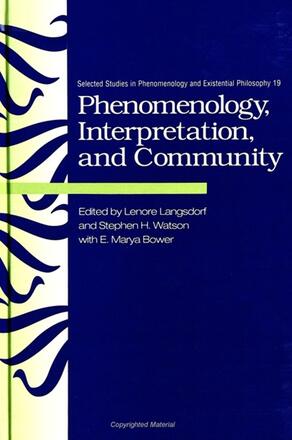
Phenomenology, Interpretation, and Community
Alternative formats available from:
This collection examines the relationship between phenomenology, interpretation, and community, considering the issues from several viewpoints including German idealism, the discourses of the Frankfurt School, and post-structuralist thought.
Description
This book re-examines the relationship between phenomenology, interpretation, and the problem of community, a topic that has been at the center of recent debates in Continental thought. From the outset, phenomenology was intimately connected with the issues of interpretation and community, both by theoretical paradigm and substance. Indeed, Husserl sought to distinguish his own foundational investigations from others that stressed the interpretive and historical character of the rational or that contested such foundational enterprises out of a concern for the critique of ideology and the "hermeneutics of suspicion. " He argued equally as stringently for the primacy of such theoretical issues over other studies, such as ethics, political theory, or aesthetics, that shaped the itinerary of philosophical inquiry. In a similar manner, the essays encountered here continue the debates that accompany the complex phenomenologies of post-Kantian Continental thought concerning the rational status of the self and its ambiguous relationship with the community—and thus, in turn, the ambiguous relationship between the "rational community," civil society, and the contested dynamics of its conceptualization and adjudication. Because it considers these issues from several viewpoints, including the legacy of German idealism and the discourses emerging from the Frankfurt School and contemporary post-structuralist thought, this volume serves both as an introduction to Continental philosophy on these issues as well as a guide to the status of recent debates.
Lenore Langsdorf is Professor of Communication at Southern Illinois University at Carbondale. She is coeditor of Recovering Pargmatism's Voice: The Classical Tradition, Rorty, and the Philosophy of Communication also published by SUNY Press, and editor of the SUNY Press series in the Philosophy of the Social Sciences. Stephen H. Watson is Professor of Philosophy at the University of Notre Dame. He is the author of Extensions: Essays on Interpretation, Rationality, and the Closure of Modernism and coeditor (with Arleen B. Dallery and E. Marya Bower) of Transitions in Continental Philosophy, both published by SUNY Press. E. Marya Bower is Assistant Professor of Philosophy at Earlham College.